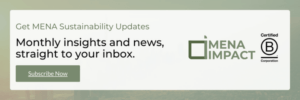In the race toward sustainability, organizations often focus on external strategies—net-zero targets, ESG compliance, and impact measurement. While these are critical, there’s an often-overlooked factor that determines long-term success: inner development.
Why do some companies successfully embed sustainability into their core strategy while others struggle? The answer lies in leadership mindset, organizational culture, and the ability to shift from short-term profits to long-term value creation.
At MENA Impact, we believe that sustainability transformation starts from within. To drive real impact, businesses must invest in the inner development of their leaders and teams, equipping them with the mindset, skills, and resilience to lead this transformation effectively.
The Leadership Shift: From Ego-System to Eco-System Thinking
The world’s sustainability challenges—climate change, inequality, and resource depletion—aren’t due to a lack of solutions. The real issue is our ability to take decisive, coordinated action. Businesses hold immense power in shaping a sustainable future, but achieving this requires a shift in mindset.
“We need to move from ego system to eco-system economics.”
Otto Scharmer
Traditional business models focus on maximizing short-term shareholder value (ego-system). Sustainable businesses, on the other hand, embrace stakeholder capitalism—aligning business success with environmental and social well-being (eco-system).
This shift demands leaders who:
- Can navigate complexity and uncertainty with clarity.
- Think systemically rather than in isolated silos.
- Build purpose-driven organizations that balance profit with impact.
For organizations looking to lead in sustainability, inner development is not optional—it’s a strategic necessity.
The Inner Development Goals (IDGs): A Framework for Business Transformation
To support leaders and organizations in this transition, the Inner Development Goals (IDGs) provide a structured approach to cultivating the skills necessary for sustainable leadership. These goals are divided into five key areas:
- Being: Cultivating self-awareness and resilience in decision-making.
- Thinking: Embracing complexity and critical thinking in sustainability challenges.
- Relating: Building trust-based relationships with stakeholders.
- Collaborating: Encouraging cross-sector partnerships for systemic impact.
- Acting: Driving meaningful change through conscious leadership.
Join MENA Impact’s community and connect with a network of impact-driven leaders, professionals, and forward-thinking businesses shaping the future of responsible growth.
Embedding Inner Development into Corporate Sustainability Strategies
For sustainability to be more than a compliance exercise, businesses must prioritize leadership and cultural transformation. Here’s how:
- Invest in leadership development: Train executives and managers on sustainability leadership, ensuring they have the skills to drive change.
- Foster a culture of purpose: Align corporate values with sustainability principles, ensuring teams understand their role in creating impact.
- Encourage cross-functional collaboration: Break down silos and embed sustainability across departments—from finance to operations to HR.
- Leverage community learning: Engage with sustainability experts, peer organizations, and innovation networks to stay ahead of emerging trends.
The Future of Business is Purpose-Driven—Is Your Organization Ready?
Sustainability success starts from within. Businesses that cultivate purpose-driven leadership, embrace eco-system thinking, and embed sustainability at their core will not only mitigate risks but unlock long-term competitive advantage.
At MENA Impact, we equip organizations with the knowledge, tools, and community to integrate sustainability into their business models effectively.
Become a MENA Impact member for exclusive access to sustainability resources, tools a thriving community through both online and offline events.





